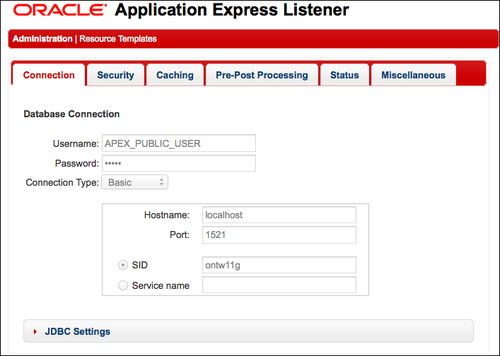Choosing a web server
When using a web-based development and runtime environment, we have to use a web server.

Architecture of APEX
The choice of a web server and the underlying architecture of the system has a direct impact on performance and scalability. Oracle provides us with three choices:
Oracle HTTP Server (OHS)
Embedded PL/SQL Gateway (EPG)
APEX Listener
Simply put, the web server maps the URL in a web browser to a procedure in the database. Everything the procedure prints with sys.htp package, is sent to the browser of the user. This is the concept used by tools such as WebDB and APEX.
OHS
The
OHS is the oldest of the three. It's based on the Apache HTTP Server and uses a custom Apache Module named as mod_plsql:

Oracle HTTP Server
In release 10g of the database, OHS was installed with the database on the same machine. Upward to the release 11g, this is not the case anymore. If you want to install the OHS, you have to install the web tier part of WebLogic. If you install it on the same machine as the database, it's free of extra licence costs. This installation takes up a lot of space and is rather complex, compared with the other two. On the other hand, it's very flexible and it has a proven track record. Configuration is done with the text files.
EPG
The EPG
is part of XML DB and lives inside the database. Because everything is in the database, we have to use the dbms_xdb and dbms_epg PL/SQL packages to configure the EPG. Another implication is that all images and other files are stored inside the database, which can be accessed with PL/SQL or FTP, for example:

Embedded PL/SQL gateway
The architecture is very simple. It's not possible to install the EPG on a different machine than the database. From a security point of view, this is not the recommended architecture for real-life Internet applications and in most cases the EPG is used in development, test, or other internal environments with few users.
APEX Listener
APEX Listener is the newest of the three, it's still in development and with every new release more features are added to it. In the latest version, RESTful APIs can be created by configuring resource templates. APEX Listener is a Java application with a very small footprint. APEX Listener can be installed in a standalone mode, which is ideal for development and testing purposes. For production environments, the APEX Listener can be deployed by using a J2EE compliant Application Server such as Glassfish, WebLogic, or Oracle Containers for J2EE:

APEX Listener
Configuration of the APEX Listener is done in a browser. With some extra configuration, uploading of Excel into APEX collections can be achieved. In future release, other functionalities, such as OAuth 2.0 and ICAP virus scanner integration, have been announced.

Configuration options of the APEX Listener
Like OHS, an architectural choice can be made if we want to install APEX Listener on the same machine as the database. For large public applications, it's better to use a separate web server.
Many documents and articles have been written about choosing the right web server. If you read between the lines, you'll see that Oracle more or less recommends the use of APEX Listener. Given the functionality, enhanced security, file caching, flexibility of deployment possibilities, and feature announcements makes it the best choice.
























































